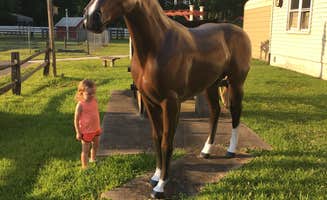Chippokes State Park Campground offers several accommodation types near Smithfield, Virginia. This region sits along the James River at elevations under 100 feet with sandy riverbanks and mixed hardwood forests. Summer temperatures typically range 75-90°F with high humidity while spring and fall provide milder camping conditions from 50-75°F.
What to do
Shoreline exploration: Chippokes State Park Campground provides excellent riverfront access with fossil hunting opportunities. "Hunt for sharks teeth on the beach. Pool is very clean," notes Danielle H. about the activities available along the James River.
Paddling opportunities: The waterways around campgrounds near Smithfield offer peaceful kayaking experiences. According to Christina from Chippokes State Park Campground, visitors should "definitely recommend following the river inland and kayaking through the marshland."
Historical immersion: Learn about regional farming heritage at the agricultural museum. As one camper at Kiptopeke State Park Campground explains, "Virginia has some wonderful state parks and this is one of them. Its got a nice beach, boat launch and a couple miles of hiking trails."
What campers like
River access: Campers appreciate the James River shoreline. One visitor to Chippokes mentions, "The still working farm and homes are a treasure of how life and farms ran back in the day and how they can survive into the future."
Clean facilities: Multiple reviews highlight well-maintained amenities. Johnathan M. notes about Northwest River Park & Campground: "Overall amazed at the cleanliness of the campground. The staff is very friendly. The park was very quiet going into the night."
Ferry connection: The ability to transport horses and trailers via the Jamestown-Scotland Ferry adds convenience. Philip S. shares, "About 5 miles away is the ferry to Williamsburg...its free and usually a highlight of the trip for the kids!"
What you should know
Site selection: Choose your site carefully based on shade and terrain. At Chesapeake Campground, an RVer advises: "Plenty of room..showers/bathrooms huge..water NOT at all sites but easy to fill tanks. Some sites close to main road but not a lot of traffic."
Seasonal considerations: Many equestrian campgrounds near Smithfield close during winter months. Northwest River Park operates from April 1 through November 30, while Chippokes runs from late March through early December.
Weather preparation: Low-lying areas can flood during heavy rain. One Northwest River camper reported, "Because this area is near wetlands some of the campsites were flooded throughout the weekend. If rain a lot of rain is forecasted you may want to talk to one of the rangers about your particular site."
Tips for camping with families
Beach activities: The shallow water areas provide safe play spaces for children. Susan P. from Chippokes State Park Campground shares, "The water at the beaches is so shallow great for my son! It's a beautiful place!"
Pool access: Swimming facilities provide alternative water recreation. Virginia B. notes about Northwest River Park: "Great Campground! We took 6 teenagers camping and they had a blast! Especially the pool!"
Educational opportunities: Several parks offer interpretive programs about local history. One visitor to Kiptopeke explains, "There are wooden boardwalk trails in the park and a few of them leads to different areas on the beach. We used 2 of them that were wheel chair accessible."
Tips from RVers
Loop selection: Different camping loops offer varying amenities and privacy levels. At Kiptopeke State Park, Aaron S. suggests, "Try and get C loop spots 15 - 21. They're shaded and at the back of the loop."
Leveling requirements: Some sites require additional equipment for comfortable setup. A camper at Chesapeake Campground shares, "The sites are gravel and mostly level but I did have to use a couple blocks of my levelers."
Equestrian considerations: While dedicated horse facilities are limited, some accommodations can be made. Visitors seeking horse campgrounds near Smithfield should contact parks directly about trailer parking and containment requirements, as many sites lack permanent equestrian infrastructure.


